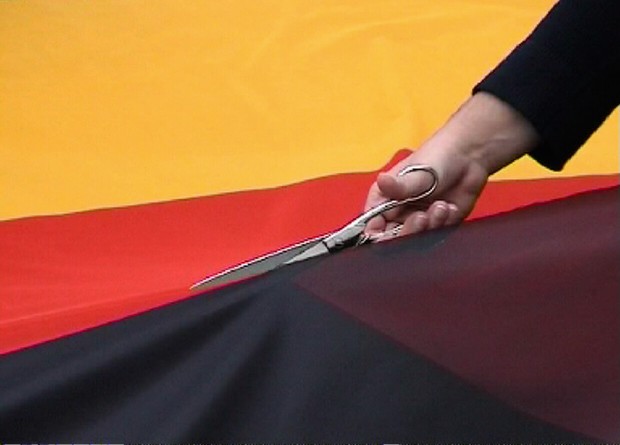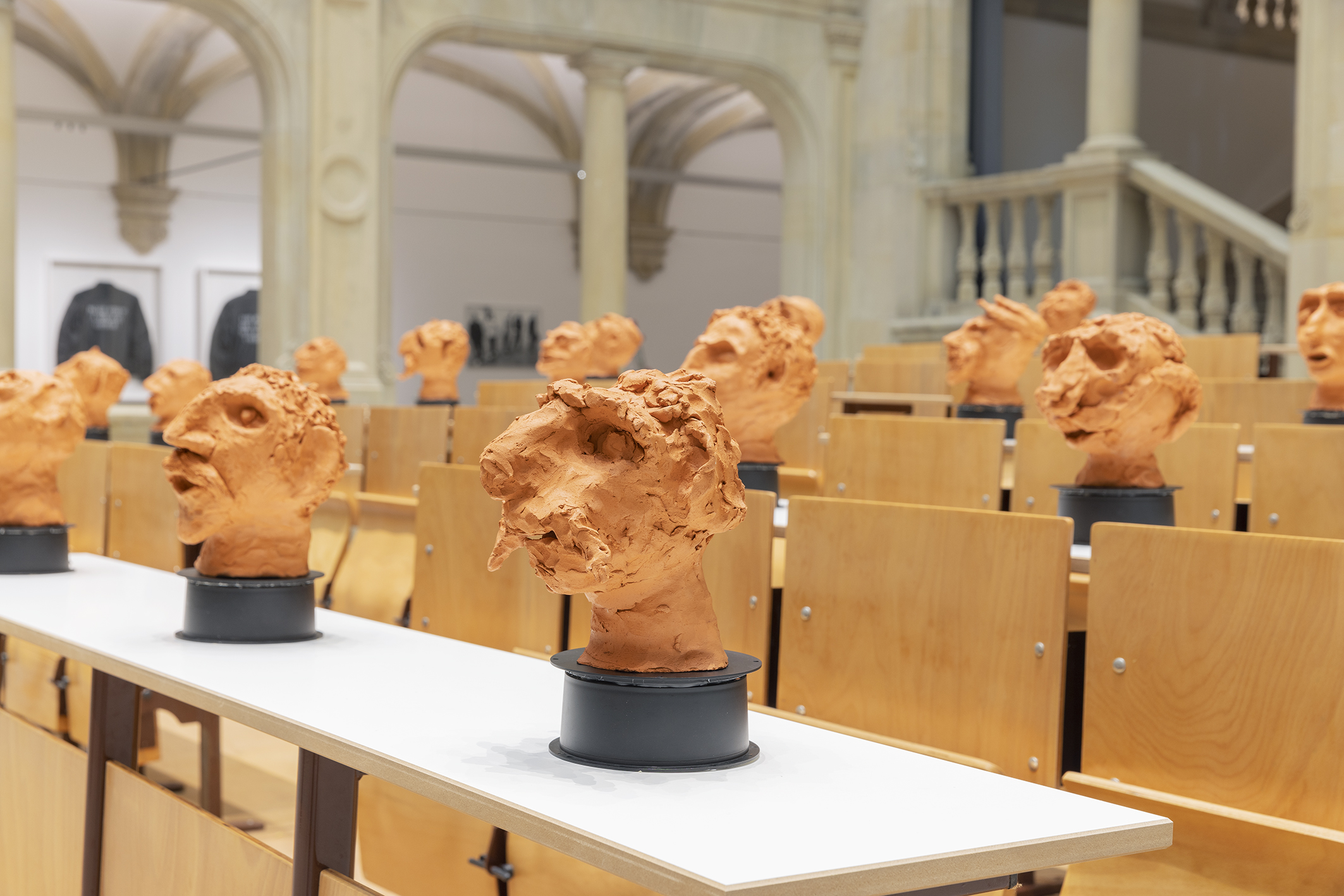Esra Ersen: A Possible History – Konrad-von-Soest-Prize 2023
Konrad-von-Soest-Preis
Every five years, the association Landschaftsverband Westfalen-Lippe sponsors the Konrad von Soest Prize which is endowed with 35,000 euros and awarded to an artist for his or her outstanding achievements in visual arts. Laureates of the prize include Josef Albers, Otto Piene, Hilla and Bernd Becher, Rosemarie Trockel, Johanna Reich, Andreas Siekmann and Tatjana Doll. In 2023, the jury awarded the prize to Esra Ersen. The LWL-Museum für Kunst und Kultur is now hosting an exhibition with works by the prizewinner and accompanying thematic events.
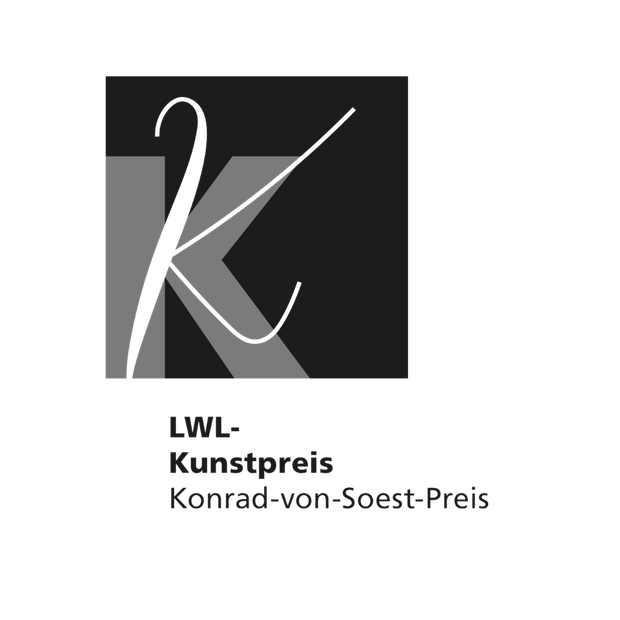
Esra Ersen
Esra Ersen lives and works in Berlin. She was born in Ankara in 1970 and studied in Istanbul and Nantes. In 2019, she was awarded a scholarship by Deutsche Akademie Rom Villa Massimo. Her works have been shown in solo and group exhibitions in various countries.
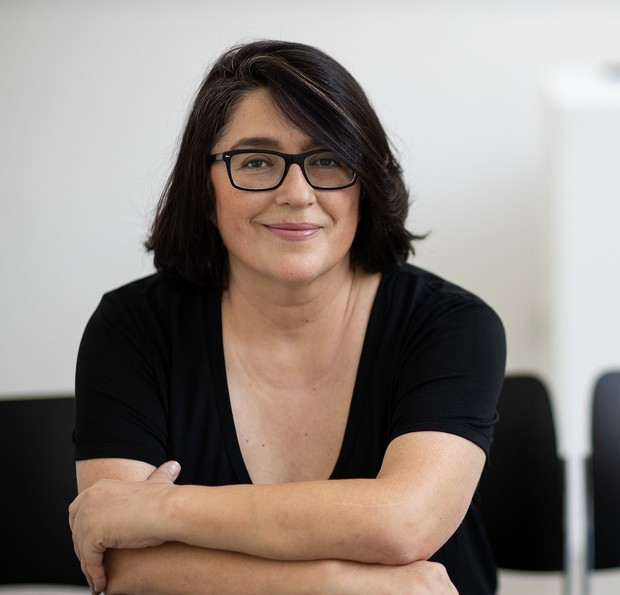
Exhibition
Esra Ersen’s photographs, videos and installations explore the relationship between individuals and society, focusing on history in general, historical perspectives, and the deep differences between oral tradition and collective memory. Dealing with everyday culture, educational structures and cultural symbols in changing times, Ersen’s works evidence the contradictions inherent in social reality. Moreover, they again and again approach identity and how it develops in a given society. To achieve her goals, the artist favours joyful and subversive encounters with groups such as youth gangs, school classes, refugees and migrants. Her works are a kind of historical and socio-political studies meant to prompt us to carefully consider how much clichés determine our perception. Encompassing a period that starts with the establishment of the Turkish Republic one hundred years ago and reaches up to the present, these works render facts that are transferable to non-Turkish cultural spaces. ‚A Possible History‘, the exhibition staged in the atrium of Münster’s LWL-Museum für Kunst und Kultur, includes photographs, objects, installations, and three videos created in recent years that are the source of the exhibition’s title. The last of these, ‚A Possible History III‘, was co-produced by the Museum and premiered in Münster.
Curator: Dr. Marianne Wagner
Veranstaltungen
Alle Veranstaltungen in der Übersicht:
Literature Talk
Literature Talk
Thursday, 7th September 2023, 7 pm | Auditorium
Individuum, Heimat, Sprache.
Kübra Gümüşays „Sprache und Sein“
Literature Talk
Wednesday, 7th February 2024, 7 Uhr | Auditorium
Zwischen Abgrund und Strategie
Şeyda Kurts „Hass – Von der Macht eines widerständigen Gefühls“
Künstlerinnengespräch
Artist Talk
Tuesday, 12th September 2023, 7 pm| Auditorium
Esra Ersen im Gespräch mit Kuratorin Dr. Marianne Wagner
Digital Theme Evening
Wednesday, 20th September 2023, 6 pm via Zoom
A Possible History. With Esra Ersen and Dr. Marianne Wagner
Webinar-ID: 655 2600 8403
Kenncode: 54507758
Lectures
Lecture
Thursday, 28th September 2023, 7 pm| Auditorium
Islamische Kunst. Zwischen Religion und Rezeption
Prof. Dr. Wendy M. K. Shaw, Freie Universität Berlin
Vortrag
Mittwoch, 10. Januar 2024, 7.30 pm | Auditorium
Identity potentials in a post-migrant society
Prof. Dr. Aladin El-Mafaalani, University of Osnabrück
FilmGalerie
24th Oktober – 14th November 2023, each 7.30 pm | Auditorium
New turkish film
Tuesday, 24 October, 7.30 p.m.
Takva: A Man's Fear of God
TUR / D 2006 Colour, 100 min., Original with German subtitles
Director: Özer Kiziltan
Introduction to the series and the film: Dr. Daniela Sannwald (Berlin)
Thursday, 2 November, 7.30 p.m.
Hayat Var
TUR / GRC / BGR 2008 colour, 121 min., Original with English subtitles
Director: Reha Erdem
Introduction Film: Amin Farzanefar (Cologne)
Tuesday, 14 November, 7.30 p.m.
Three Monkeys (Üç Maymun)
TUR / F / I 2008, colour, 109 min., German Version
Director: Nuri Bilge Ceylan
Introduction: Prof. Dr. Reinhold Zwick (Münster)
Wednesday, 22 November, 7.30 p.m.
Karpuz kabugundan gemiler yapmak (Boats out of watermelon rinds)
TUR 2004, colour, 97 min. Original with English subtitles
Director: Ahmet Uluçay
Introduction: Dr. Daniel Müller Hofstede (Münster)
Tuesday, 28 November, 7.30 p.m.
Mustang
TUR / F / QAT / D 2015, colour, 94 min., German Version
Director: Deniz Gamze Ergüven
Introduction: Elke Kania M.A. (Cologne)
Concerts
Concert
Monday, 15th January 2024, 7.30 pm| Foyer
Drehkreuz Bosporus - a concert between Asia and Europe
with Christiane Oelze (soprano) and the E-MEX Ensemble (Essen)
Concert
Monday, 5th February 2024, 8 pm | Foyer
Derya Yildirim & Grup Şimşek – ANATOLIAN ROCK
In Cooperation with Gleis 22
Podium
Thursday, 15th Februar 2024, 7 pm | Auditorium
Identity, Language and the Claim to Interpretation
Artists in museums
with Prof. Dr. Gürsoy Doğtaş, Berlin University of the Arts,
Esra Ersen, artist,
Dr. Sylvia Necker, Prussia Museum Minden,
Dr Marianne Wagner, LWL Museum of Art and Culture
Esra Ersen: A Possible History
Carousel
This installation is the result of an experiment performed in the biology lecture hall of a Cologne high school. It involved the picture of a painting from 1814 that was projected onto a wall and shows the famous Vienna Winter Riding School, with smartly dressed people in the balconies watching cavalrymen poking papier mâché heads with their lances. The game, called “Poking Turk Heads”, was a popular amusement at the court of the Habsburg
empire until the 19th century. After the projection, Esra Ersen asked the pupils to model clay heads that render their feelings when they hear the word “Turk”. In the installation, the heads were placed on turntables in the biology hall where the image of the painting had been projected.

A Possible History I
‘A Possible History I’ endeavours to generate an encounter between past and present. A character named “E” undertakes a five-day journey to Sofia, Bulgaria, in 2013, in the footsteps of Ottoman Balkan travellers of the early 20th century. Talking with scholars and artists, “E” discovers lore of yesteryear and understands how stereotypes structure our perception of history and the concept of nation. At the same time, the video evidences the limits of rendering history with images. The cultural transfer between Turkey and the Balkan states produced surprising phenomena that contrast with the official narrative.
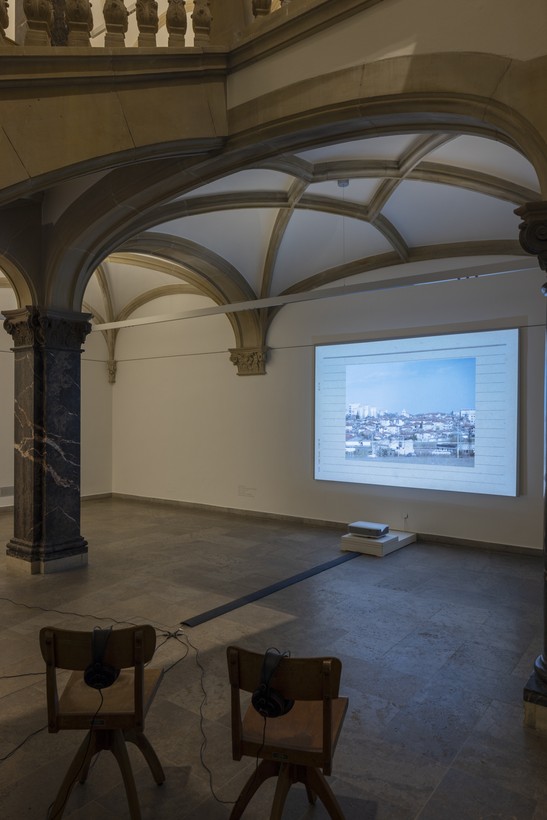
A Possible History II
“E” once again takes a journey through time in the following video, ‘A Possible History II’. Visiting Istanbul’s Military Museum, the character discovers how national mythology can be developed, and Esra Ersen examines how comics, museums, school books, and television series present cultural phenomena. Focusing on the narratives that have accompanied Turkey’s nation building since the beginning, the video evokes the contradictions that arise from nonlinear perspectives serving political interests. With this work, the artist examines who holds sovereignty over the interpretation of visual culture and who decides what is to be shown, and what shall remain hidden.
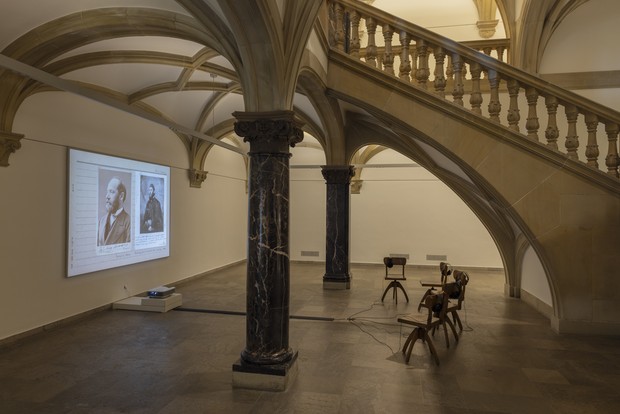
Rehabilitation
Esra Ersen worked in São Paulo with a group of young former gang members who had taken part in a rehabilitation project. In an endeavour to reverse the social rehabilitation process, the artist prompted the youngsters to criticize the Brazilian society using slogans that were printed on the backs of their leather jackets. Eight of them were worn by the former gang members in the streets of São Paulo, while duplicates of the other eight became exhibition pieces.
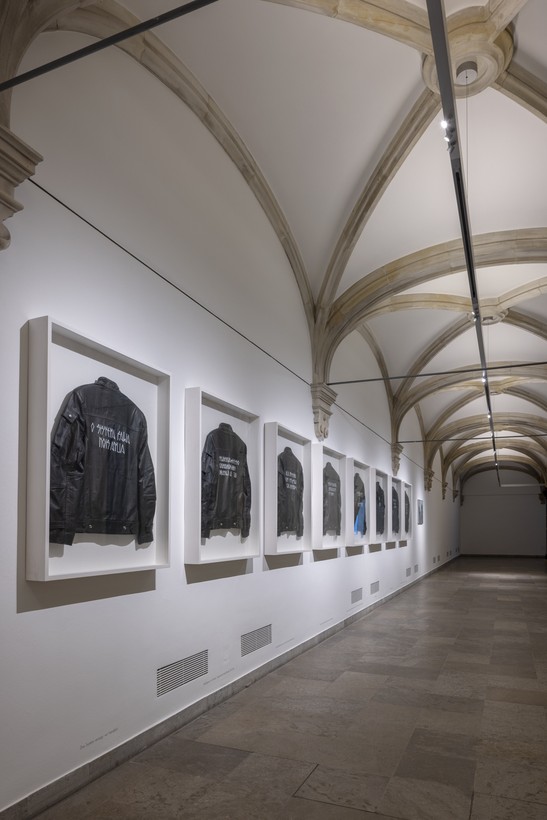
I am turkish, I am Honest, I am Diligent
Esra Ersen created the work ‚I am Turkish, I am honest, I am hardworking‘ in collaboration with the fourth grade of the primary school in Velen, a town near Münster. One week long, the pupils wore Turkish school uniforms and noted their impressions in a diary. Subsequently, the artist had the pupils’ statements printed on uniforms designed in Turkey. They convey ideas such as social equality and a classless nation and refer to morality, state policy and educational ideology. Moreover, the title of the work quotes the first three lines of an oath that Turkish children take in primary school.

A Possible History III
In her third video, ‘A Possible History III, 23/23 Blaupause’, Esra Ersen examines the century that extends between the establishment of the Turkish Republic in 1923 and the present. The film starts with an anecdote related to the knitting needles of the artist’s mother and includes drawings, photos from family albums, book illustrations and archive documents, with all these items being used to generate contrasts between national history and intimate facts. In the process, various events and people fallen into oblivion come to the foreground. This applies in particular to Halide Edib, a Turkish writer who, like many others, advocated a reformist utopia.

Diario
The series deals with two issues in Italy: on the one hand, waste management, which has been a profitable business for the Mafia for decades and prevented the state from financing proper incineration plants; on the other hand, the large number of refugees who often live hopelessly and suffer exploitation. Due to such a confusing situation, the country is deeply divided and the social climate fosters far-right positions. The artists transforms the heaps of dirt, gathered by illegal immigrants who sweep the streets for small donations, into still lifes that evidence the presence of refugees and are thus allegories of the Italian social problems.

Sammelsurium
The photographs figure objects from a second-hand store called ‘Sammelsurium’, the German word for “hotchpotch”. Esra Ersen created the series in collaboration with the museum of local history of Wilhelmsburg, a district of Hamburg. Lovingly arranged objects from the pre-industrial era, anachronistic in our everyday life, are complemented by others that belonged to families of immigrants living in Wilhelmsburg. The series thus illustrates the recent local history of the district and scrutinizes the idea of “feeling at home”.

In the Penalty Area
Three girls with long dark hair cut the black stripes out of German flags and sew the yellow and red ones back together. In this way, the German national flag becomes the flag of the football club “Galatasaray Istanbul”. Subsequently, the black-haired girls lie down on the stripes and the flags regain their tricolour character. The video thus not only scrutinizes the concept of national unity, but also suggests that all members of a given society have a constitutive role in the production of national identity. No one is in the penalty area, everyone is on the pitch.
